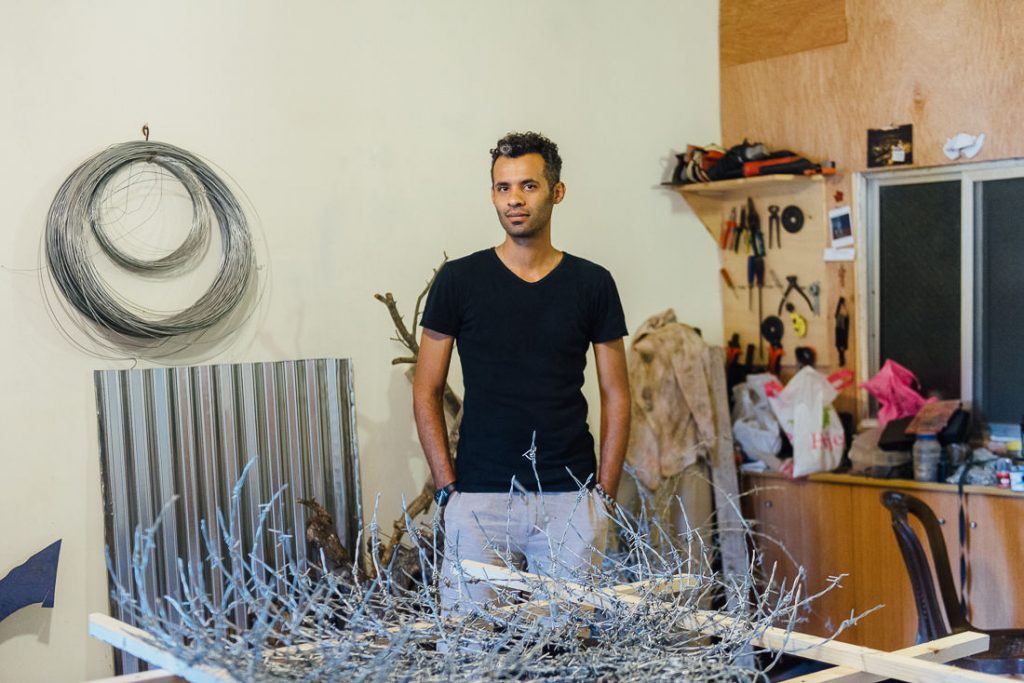São Paulo – Palestinian artist Abdul Rahman Katanani (pictured above) is participating in an artistic residence in Brazil and will take part in a series of activities in both Sergipe and São Paulo, including public meetings till the end of the next week. Katanani is one of the world’s greatest contemporary artists and was invited to Brazil by Beit21, a platform for South-South artistic and cultural interchange.
Katanani was born in 1982 at refugee camp in Sabra, Lebanon, a year after the massacre that took place there. The artist was raised in the camp and his art is mostly a reflection about life as a refugee and among refugees. To create his installations and sculptures, the artists uses materials available in the camp, such as cardboard and old rags and tools. Sculptures in barbed wire are one of the artist’s trademarks.
The residence’s curator Geraldo Campos says that he discovered Katanani’s work at a gallery in Lebanon and was mesmerized by the artist’s giant wave made of barbed wired that seemed it would break over the visitor. Campos wanted to know more about the artist and met him in Paris, France some time later. “His art is very powerful, striking. Besides being an artist, he reflects on art,” says Campos, who is also one of Beit21’s founders.
The curator highlights the way Katanani deals with the singularity of producing an aesthetics based on a refugee camp. The Palestinian started painting as a child about the day-to-day reality in the camp where he lived and got into the art world as a cartoonist. His work is considered by many critics as a realistic, vivid picture of Palestinians’ hardships and resistance.
The Palestinian started his artistic residence in Brazil in Sergipe, where he had participated in talks and worked with different artists. Next Friday (15) at 5 pm, he’ll talk to the public about the theme “Between camps and checkpoints – Two perspectives on Palestine,” a chat that will feature Palestinian sociologist Baha Hilo and be mediated by Ahmed Zoghbi, one of Beit21’s founders. Hilo’s work is focused on education. He takes groups of foreigners to get to know the Palestinian reality.
The encounter between Katanani, Hilo and Zoghbi will take place at Teatro Elic at Cine Trianon in the city of São Cristóvão, Sergipe as part of the program of the 36th São Cristovão Arts Festival (FASC). On the same place, at 2 pm, the movie “Football and Barriers” will be screened and followed by a debate with director Arturo Hartman, another Beit21’s founder. As part of FASC, Katanani will make an artistic intervention with local artists in the morning. The festival will also include a literature workshop by Ahmed Zoghbi themed “Resistance Literature” on Palestinian literature at the São Paroquial at the Igreja Matriz de São Cristovão on the 16th at 2 pm.
Next week, Katanani will be in São Paulo. On Monday (18) at 7:30 pm, he’ll participate in a chat with Brazilian plastic artist Lia Chaia with the theme “Art in the camp: The permanence of the provisional.” The encounter takes place at Ateliê 397 in the neighborhood of Pompeia in São Paulo. Next Wednesday (20), the Black Awareness Day, the Palestinian will hold a workshop called “Art and extermination territory: Black bodies, Palestinian bodies” at Ocupação 9 de Julho with Baha Hilo and Brazilian plastic artist Moisés Patrício in the neighborhood of Bela Vista.
The Beit21 platform was launched last year and one of its first activities was holding a program in Brazil in September 2018 in honor of Palestinian actress Hiam Abbass, which included theater performances, movie screenings, debates, and other activities featuring Hiam. The Palestinian actress’ visit was the focus of the 1st Cycle of Palestinian Art in Brazil.
This year, the platform brought Katanani as a guest for an artistic residence, which is part of the 2nd Cycle of Palestinian Art in Brazil. For 2020, the call to artists to apply for residence is open, says Geraldo Campos. The platform is directed to the entire South region but currently is focused on bringing Brazilian and Palestinian artists’ work closer to each other.
The cycle and the artistic residence are supported by the Arab Brazilian Chamber of Commerce and the Federation of Muslim Associations in Brazil (Fambras) and are being held by Beit21 in partnership with other organizations such as the Faculty Association in the Federal University of Sergip (Adufs) and the Cultural Foundation City of Aracaju (Funcaju). The launch of Beit21 was also supported by the Arab Chamber.
Quick facts:
2nd Cycle of Palestinian Art in Brazil
1st Artistic Residence Experience
Sergipe – São Paulo
Hosted by Beit21 – Find out more here
Translated by Guilherme Miranda




